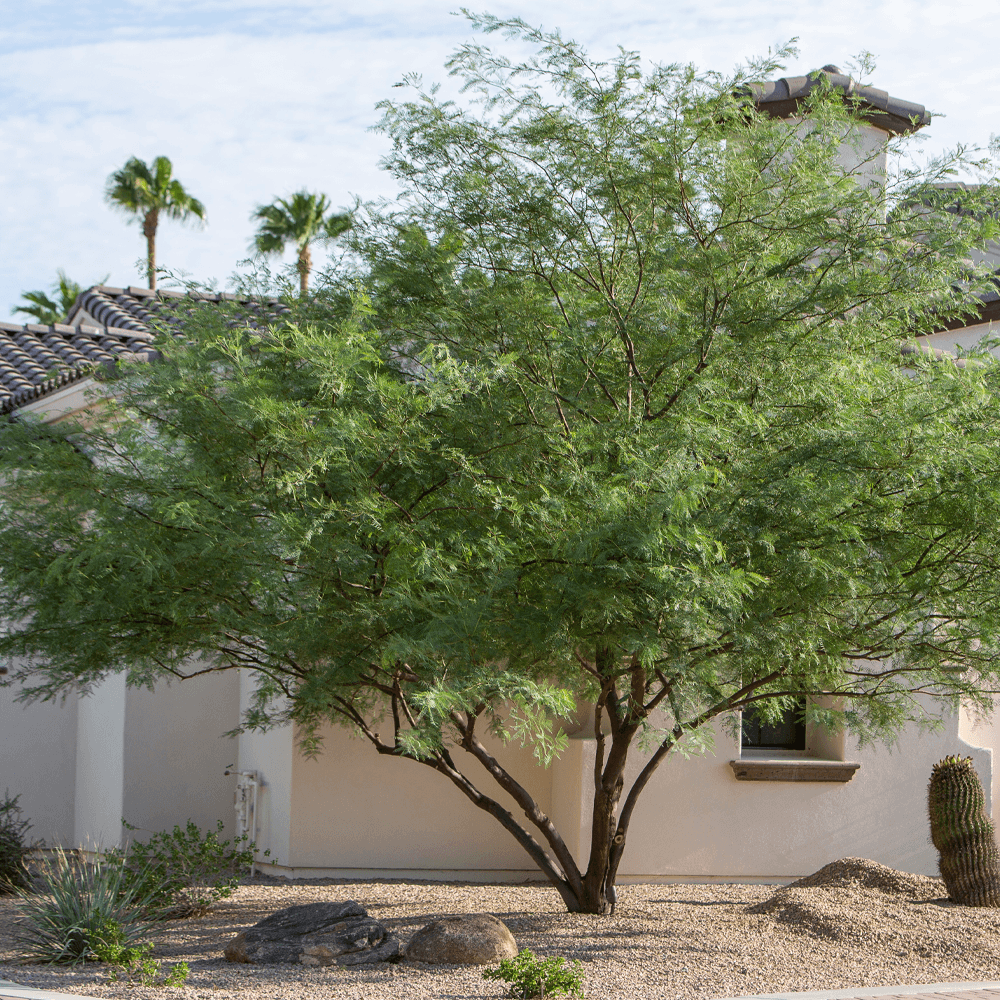AMWUA Blog
BY: AMWUA StaffTrees play a vital role in our communities

There are many ways to enhance any landscape, but one of the most beneficial ways is with trees, especially desert-adapted ones that can thrive in our arid climate. While planting the correct type of tree will make an immediate visual impact because of its beauty, color, and texture, trees also bring many benefits when planted and cared for properly. Low-water-use trees provide social, communal, environmental, and economic benefits for everyone and positively impact our desert communities in various ways.
Trees provide shade and cooling. Trees mitigate heat and play a crucial role in the desert, especially with our climate getting hotter. They reduce temperatures through shade and by transpiring water. One mature tree can produce the same cooling effect as ten room-sized air conditioners. This becomes an effective tool in reducing urban heat islands and hot spots in cities.
Trees help clean the air. Trees filter the air of contaminants and are proven to absorb carbon dioxide, which comprises over 80 percent of greenhouse gases in the US. Planting trees remains one of the cheapest, most cost-effective means of drawing excess carbon dioxide from the atmosphere. Trees breathe in pollutants but then breathe out oxygen. One large tree can provide a day’s supply of oxygen for up to four people.
Trees can help us save energy. Having shade trees in your yard can help reduce your energy bill by allowing you to save on air conditioning. Carefully positioned trees can reduce a household’s energy consumption for heating and cooling by up to 25 percent.
Trees help clean our water. Trees serve as natural sponges, collecting and filtering rainfall and releasing it slowly into streams and rivers, and are the most effective land cover for maintaining water quality. The ability of forests to aid in the filtration of water benefits our health and the health of an ecosystem and can aid in water treatment. Forests provide these benefits by filtering sediments and other pollutants from the water in the soil before it reaches a water source, such as a stream, lake, or river.
 All these benefits are why the AMWUA cities have embraced planting and properly maintaining desert-adapted trees to cool streets, buffer noise, and help with air quality. They have established goals of increasing shade tree canopies in their long-range plans to enhance their communities, which benefits us all. The AMWUA members are examples of how municipalities have long been dedicated to community forestry. Each has been named a Tree City USA community by the Arbor Day Foundation to honor their commitment. We can all play a part in creating a beautiful urban forest and collectively enjoy how water-efficient trees enhance our health, yards, communities, and environment here in the desert.
All these benefits are why the AMWUA cities have embraced planting and properly maintaining desert-adapted trees to cool streets, buffer noise, and help with air quality. They have established goals of increasing shade tree canopies in their long-range plans to enhance their communities, which benefits us all. The AMWUA members are examples of how municipalities have long been dedicated to community forestry. Each has been named a Tree City USA community by the Arbor Day Foundation to honor their commitment. We can all play a part in creating a beautiful urban forest and collectively enjoy how water-efficient trees enhance our health, yards, communities, and environment here in the desert.
Selecting the right tree for the right space is important. To find the most appropriate desert-adapted trees for your yard, AMWUA’s Plants for the Arizona Desert has a detailed tree section to help. Learn more HERE .
For additional information, you can always rely upon the expertise of your local conservation office and learn more about regional programs such as SRP Shade Tree Program, which provides customers up to two free desert-adapted trees (approximately 4-to-6-foot saplings) to plant in energy-saving locations around your home.
For over 50 years, the Arizona Municipal Water Users Association has worked to protect our member cities’ ability to provide their communities with assured, safe, and sustainable water supplies. For more water information, visit www.amwua.org .
